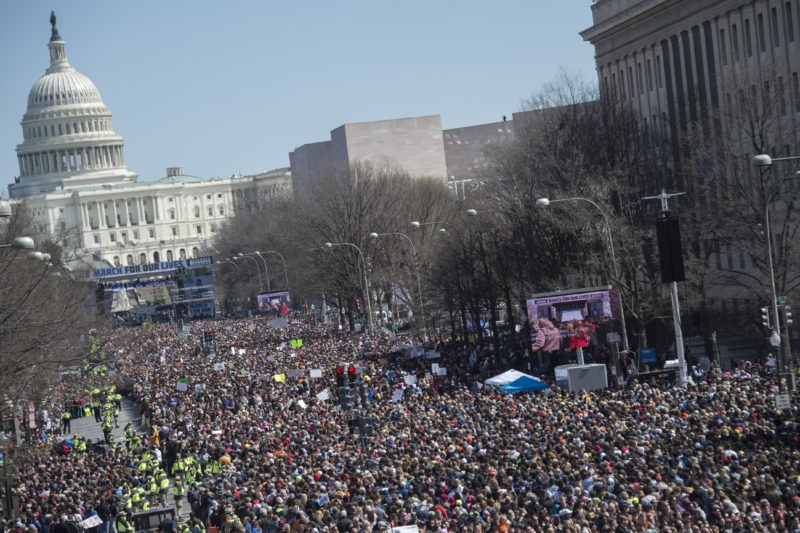US Congress returns after a bloody August sharpens focus on guns
US lawmakers return to Washington on September 9, 2019 after a break during a summer that saw dozens of people killed in multiple mass shootings, and as Democrats including several 2020 presidential candidates demand action to rein in gun violence (Andrew CABALLERO-REYNOLDS)
Washington (AFP) – The US Congress convenes Monday for the first time since recent mass shootings left Americans distraught over surging violence, but the Senate’s Republican leader stressed he would not consider gun legislation without President Donald Trump’s backing.
Horrific public shootings last month in El Paso and Odessa, Texas, and in Dayton, Ohio left 38 dead, galvanizing activists and other Americans into demanding that lawmakers take steps to reduce the country’s unchecked gun violence.
They point to legislation that has already cleared the Democratic-led House of Representatives, including bills to expand background checks for would-be gun buyers — a move overwhelmingly supported by the public — and to close loopholes that have enabled some firearms to be transferred before checks are completed.
Lawmakers scheduled a forum Tuesday to demand Senate action, and some Democratic presidential candidates have called for a ban on military-style assault weapons like those used in recent massacres.
But Senate Majority Leader Mitch McConnell cautioned he would only bring a gun bill to a vote if Trump makes clear he is willing to sign it into law.
“The administration is in the process of studying what they’re prepared to support, if anything, and I expect to get an answer to that next week,” McConnell told the Hugh Hewitt radio show Wednesday.
“If the president is in favor of a number of things that he has discussed openly and publicly, and I know that if we pass it it will become law, I’ll put it on the floor.”
Shortly after a gunman stormed a Walmart store in El Paso and killed 22 people in a hate-inspired August 3 attack, Trump said there was “very strong appetite” for expanding background checks.
But he has flip-flopped on the issue. After meeting soon after the El Paso attack with leaders of the National Rifle Association, the powerful pro-gun lobby, the president has gone quiet on background checks.
Instead he has focused on the issue of mental health.
The White House’s expected proposal may include stiffer penalties for gun law violators, but it may also support so-called red flag laws, which allow police to confiscate firearms from those judged to pose a danger to themselves or others.
Meanwhile, Democrats are considering three new bills in addition to those that have passed the House. One would ban high-capacity magazines, while another would prevent anyone convicted of hate crimes from obtaining a gun.
Amid Capitol Hill’s paralytic response, The Washington Post editorial board delivered a searing indictment of McConnell’s inertia and highlighted the staggering toll that “America’s gun insanity” has wrought.
“Do something, Mr. McConnell,” blared Wednesday’s full-page editorial.
– ‘Major shift’ –
There were 39,773 US gun deaths in 2017, more than half of them suicides. That year saw the largest mass shooting of modern times in America, the massacre of 58 people at a concert in Las Vegas.
In February 2018, 17 were shot dead in a Parkland, Florida high school. Nine months later, 25 were slaughtered in a church in Sutherland Springs, Texas.
The constant eruptions of horror form a uniquely American emergency. Each mass shooting is followed by grief, indignation and prayers — and calls to action that go largely unanswered.
Cynical gun-reform supporters say they expect little to change, especially given that Capitol Hill failed to act even after 20 children were gunned down at a Connecticut elementary school in 2012.
But since Parkland, whose surviving students launched a popular anti-gun movement, and the 2018 midterm elections, some people believe Washington might finally decide to act decisively against the scourge.
Trump, eager to rally his conservative base ahead of the 2020 election, is unlikely to reach out to more moderate forces and support major action on guns in the near term, predict experts including Robert Spitzer, chair of political science at the State University of New York College at Cortland.
But the outcome of the 2020 election “could result in a major shift toward new gun laws if the Democrats do well,” Spitzer told AFP.
The summer carnage has given Democratic White House hopefuls the impetus to publicize their positions.
“The front-runners seeking the Democratic nomination (are) all willing to speak out for strong gun-control legislation,” said Gregg Carter, professor of sociology at Bryant University in Rhode Island.
Most presidential candidates, including Democratic frontrunner Joe Biden, are calling for an assault weapons ban similar to one that Bill Clinton signed in 1994 and which was allowed to expire 10 years later.
Candidate Beto O’Rourke, who formerly represented El Paso in Congress, has gone further, calling for a mandatory buyback program for assault weapons.
“The challenge is so grave, the threat is so great, we can’t meet it with half-measures,” O’Rourke told CNN Sunday.
Disclaimer: Validity of the above story is for 7 Days from original date of publishing. Source: AFP.


